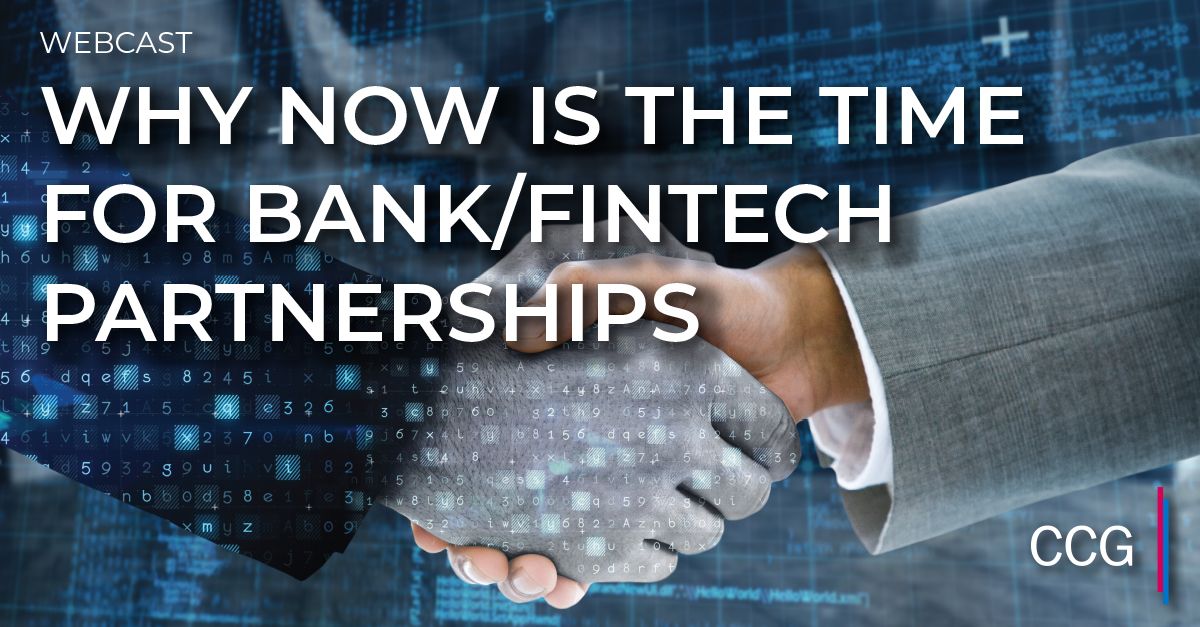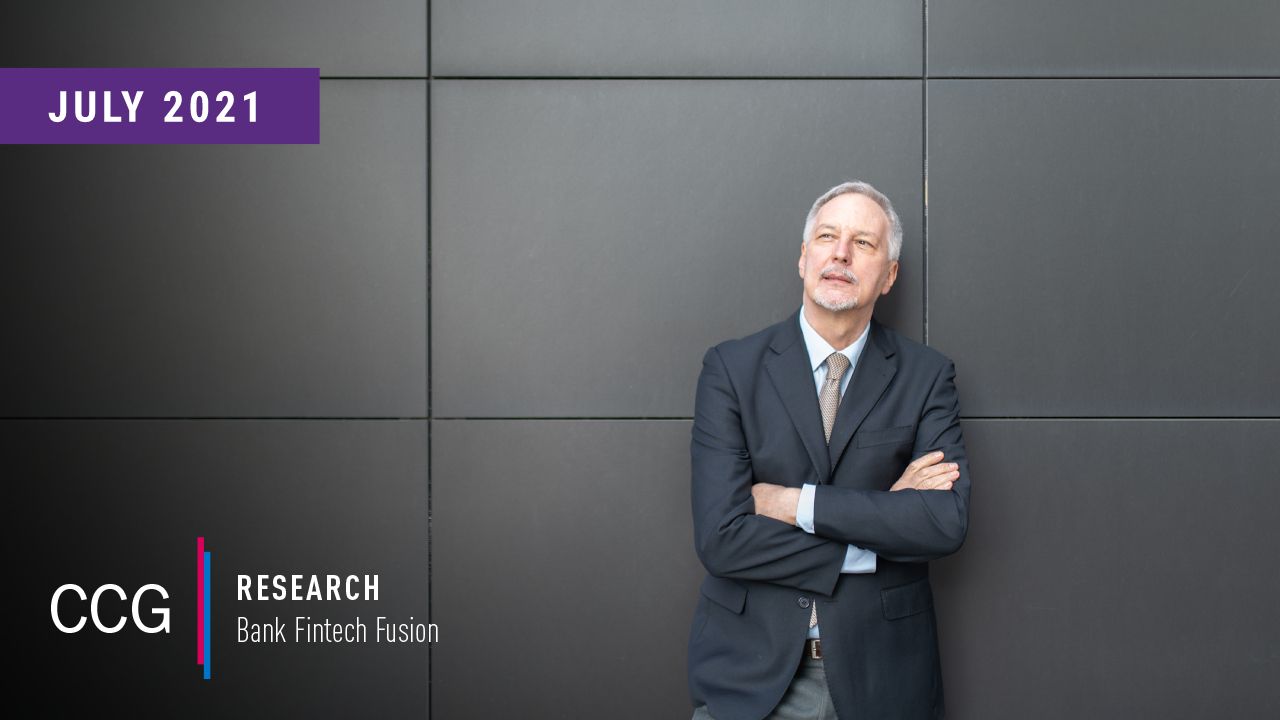Why Now is the Time for Bank/Fintech Partnerships
Available On Demand – 16 minutes
The financial services landscape is changing and banks and credit unions must not only react quickly to expand and enhance their digital offerings but they must also understand how they can accelerate their efforts through partnerships with outside parties, specifically with fintechs. Join CCG Catalyst’s fireside chat with host Emily Lockwood and fintech and banking technology expert Scarlett Sieber as they discuss why bank/fintech partnerships are crucial and leave with takeaways on how to approach a potential partnership with a fintech startup.
Subscribe to CCG Insights.
[restrict]
Emily Lockwood Hey, everyone, welcome back to the CCG Webcast. I’m your host, Emily Lockwood, Marketing and Communications Consultant at CCG. I’m joined by Scarlett Sieber today. She’s the Managing Director and Chief Strategy and Innovation Officer at CCG. Hey, Scarlett.
Scarlett Sieber Hey, Emily. Nice to be here. It’s weird being on the other side of the table for once but looking forward to our conversation.
Emily Lockwood Yeah, I’m excited to turn the table on you today. So today we’ll be talking about bank and fintech partnerships and why they’re important. But before we get into all of that, I wanted to go over a few housekeeping rules. If you look below the screen where Scarlett and I are live, you’ll see our photos. You can go ahead and give those that click, and you’ll see our bios, our emails, our Twitter, LinkedIn and you can get social with us there. You’ll also see CCG’s logo. You click on that and you’ll get some great insights from us. It’ll also drive you back to our site. Our site is filled with information for you. It’s a great resource. You can also reach out to us there, see what we’ve been up to and even see what’s coming up in our webcast pipeline. And then you’ll also see the Twitter logo. You can also click that that gets updated all the time with our trends, but also industry trends. So it’s always layers of what’s going on and baking and fintech and all things like that. So with that, I’d like to dive right into our first question. Scarlett, let’s define fintech when we say fintech, what do we really mean?
Scarlett Sieber Sure. So I get asked that question a lot, mainly by family and people when they’re saying, well, what do you actually what is fintech mean? What do you do for your job? And fintech is certainly not a new term. It’s been around for some time. But at the most simplistic piece of it, fintech is financial technology, fintech, financial technology. But really, when we’re going to be talking about it in this context, especially as it relates to bank fintech partnership, it’s about startups who are focusing on the space of financial technology, using new methods and other ways of doing things that are going to be competing with the traditional financial methods and deliveries of that technology and of those financial services.
Emily Lockwood Cool. OK. So knowing all of that, why would a bank want to partner with a fintech? What are some of the key advantages to having a relationship like that?
Scarlett Sieber There are so many reasons why a bank should want to partner with a fintech. As you will see, I may have a bit of a bias in the sense that I am very pro fintech. In the roles that I have had previous to joining CCG, I’ve been a bank executive at a variety of banks. Some of the largest global international banks are as small as a billion public regional bank on the West Coast. And in all these cases, I certainly looked at fintech as a partnership opportunity. I looked at fintech as an acquisition opportunity, as an investment opportunity. But I really am a big believer in the power of what fintech and traditional banks and credit means can do together. And I say that the high level is that fintechs can provide so many things and fill the gaps that banks have. They have access. And by the way, one thing that I hear a lot about is and what you see a lot in the press is the Big Ten, the top 10 financial situations being the ones that partner with fintech. And, of course, that is happening. But really, there are tremendous opportunities for the smaller financial institutions, the credit unions, and the banks to work with fintech. And the reason why you would want to do that is a few things. I think it’s access to testbeds. Fintechs are good at being nimble and scrappy and testing and moving quickly. So you can get you know, you can if you wanted to test a new product or service and you had a fintech who was looking at those same capabilities, what you could do is you could take that. They could go and do tests with a demographic that would take you a lot of resources to do so. There is that they typically come from very diverse backgrounds. Sometimes they do not come for financial services, but they see a problem they want to address. And so they’re thinking about problems or opportunities, maybe in a way that you are not. And so that is always helpful. I think diversity of thought is super important, especially for the smaller financial institutions. They have the tech and developer talent. I know when I was CIO of a smaller financial institution, we had I.T. ops. We didn’t necessarily have a whole team of engineers being able to go code and create stuff for us. So it’s the idea of leveraging the best of what they have. And usually they have really good tech and developer talent. It’s also about their ability. I talked a little bit about their nimbleness, but their ability to create and iterate quickly and cheaply, because what one of the things that makes us financial institutions so great is our stability and our scale, even if we’re on the smaller side. There is still scale compared to fintechs. And but the downside of that is sometimes it can take a long time to getting to a decision and move to that next thing, because there’s a lot of different competing priorities. But with fintechs, they are looking very specifically at a problem and they can test something and the next day they’re going on this path and they say, hey, this doesn’t work. Let’s move over. So that’s actually super, super beneficial. Sorry, Emily, I just thought about something, too. If we look at the other side, because I think we spend a lot of time talking and glorifying fintech and why it makes so much sense for banks. But I do think on the opposite side for a second, I want to talk about why, if you don’t mind, why fintechs should want to work with banks and especially the smaller scale ones that we’re talking about now. And I think there are kind of a few key things. I would say the one advantage of the smaller institutions have is their ability to test and iterate in a matter that is unmatched by the big banks. So we talked about that as a positive for the fintech. But that’s certainly applicable on the smaller financial institutions side as well, where if you’re talking to one of the top 10, I don’t need to name any of the names there, but something as simple as changing the little hamburger on their mobile app. The number of people that are required to be involved in that conversation, to change the way that people view your information on the app is crazy. When you’re in a smaller financial situation, it’s a lot easier to get to what you need quickly. There’s also the proximity and ease of access of decision makers. When you ratify a smaller financial institution, you can have the key executive team in the room and say, yes, we want to go with this. No, we don’t. And here’s why. When you have it at a much bigger scale, there’s a lot more levels of sign off that’s needed and a lot of times, which is pretty challenging for a fintech. And then the third thing, and this is definitely true for credit unions and definitely for community banks as well, is the active direct relationships that you all have with your members or your clients is unmatched by the big banks. They have the scale and, you know, the ease and the seamless experience or what not. But you have those relationships and that is super, super crucial for fintechs. So I just wanted to put the other side of the coin on there as well.
Emily Lockwood Sure. That’s really great to know. And you mentioned a lot about what the partnerships can do. So this leads right into my next question. So if banks and fintechs want to work together, how do you enter in to a partnership? What are the things that they need to know or do?
Scarlett Sieber There are a lot of things to think about when wanting to partner with a fintech. And I think the reality is there is not one way to do so. There are many, many ways that you as a financial institution can and can partner with one some. To give you an example, let’s say it could be about the customer experience. So you’ve probably seen the news around, you know, Apple Pay and the new Apple card and having that partnership with Goldman Sachs. There is another example with Google, Google Wallet and Google Pay and what they’re doing with Citi. So there’s the customer experience aspect, which is certainly still an example of a partnership. Those are very big partnerships. And I know that. You can also be the back end financial institution for fintechs. Like what? A crossover bank here where I am in New Jersey/New York is doing or a video is doing or even an MBK seat in Kansas City who’s acting as the back end and the depositor of record for these fintechs. You can be just a consumer of their services. So maybe you want to offer a better PFM, you know, better financial management software for your for your clients or a more enhanced saving tool. All of these things you can resell fintechs into what you’re doing or they can just extend the package and part of your services as well. There’s also there’s marketplace lending. So, of course, you can think of the big ones, like the cabbages and the on decks where you’re just buying loans from them. So there’s certainly not a shortage of ways that you can partner with them and it’s getting creative on what makes most sense for you. Sometimes it’s just even using their expertise and content and marketing as well. So there’s a lot to do there.
Emily Lockwood Yeah, it definitely sounds like that. So with all those different ways that things can partner with spin text, if you could tell a bank executive what are two key points that they should focus on when entering into our ship or if they’re looking to start one?
Scarlett Sieber Oh, goodness. I would say the most important thing and the thing that people that I’ve seen tend to get caught up on is a bit of the shiny object syndrome. Right. So I think that the first thing that I would suggest to do is to sit down with your key executives in your management team and clearly articulate and identify what is it that is your core competency. What is it that makes you as an institution unique? Where do you thrive? Where do you, you know, set apart from other people? What do you do really well? And there’s a lot of things that can be. It could be the strong brand name, like the Goldman example we talked about. It could be, you know, your lending capabilities have a really great balance sheet. So that’s a different conversation. But it’s really making sure that you’re all aligned on what your core competencies are. And that way it will better enable you to think about, like, here are the key things we want to talk about when we’re thinking of a partnership with a fintech. In a similar vein, but slightly different, it’s being crystal clear about what your goals are when partnering with fintech. What need are you solving? What direct need are you solving? And what does success look like? Because that’s where I think the shiny object syndrome comes in a lot. You go to a conference which is a little bit different in today’s world, but you go to a conference, you go listen to you. You read the greatest news about the newest thing coming out and you just say, oh, I got a have it. It’s so pretty. It’s so great without understanding or it’s not about not understanding But you’re reacting as opposed to thinking about what direct need is that solving. Is that a high priority for us? I’m going to add maybe one more there in that let’s say that you have done those first two things. You’ve agreed that this is the fintech you want to work with. This is the need that you’re solving. It’s having a transparent conversation with that fintech around expectations, timelines, budget, et cetera. By the way, that should be a reciprocal conversation. They should be as transparent with you as possible. And there’s certainly some things that you can and should ask them to do that. And that’s a whole other conversation for a different day. I know we want to keep these succinct. But I think having that transparent conversation is super important.
Emily Lockwood Great. OK. And then why would a bank want to be the first to partner with a fintech?
Scarlett Sieber Well, there is a lot of advantages to doing so. Kind of going back to when you think about what your core competencies are and who you are as an institution. It’s not surprising in financial services, in banking, we are in the risk mitigation business in many cases. So, of course, it’s not surprising that you would want to be risk averse when thinking about your strategy with fintech. And most banks take the path of I will work with a fintech, assuming they have the structure and things in place once they’ve had three, five, 10, whatever it is, other banking clients. And of course, the advantages there, because it’s been tried and tested, it has a little bit more plug and play. Now why would you want to have the first really first mover advantage? I don’t think that can be undersold or understated. That is a huge thing. And really there is the reputational component. So there’s you know, I spent a lot of time on the speaking and branding side of things. So there’s a reputational component for sure. So you’re the first one to do that press release. What’s the newest, latest and greatest fintech, which is which is pretty powerful. And if you are a type of firm that says that you are innovative or digital first or future first, you actually have the clout to back that up because just saying you’re partnering with the fintech and you’re the tenth person, that’s still a testament to you. You did a good job of getting there. But if you are the first. That’s a different conversation. And I would say the other biggest thing that I think is probably undervalued is when you are that first client, you really get to be part of a relationship with that fintech in a way that if you’re client number 10, you don’t get to be. And that really means being part of even helping to shape their roadmap, giving them feedback and almost like doing some customization, probably without even the cost of what it exactly is that you want, because they have an idea of what it is that you as a financial institution want. But you are the experts in what you do. And so together they can help to kind of change and morph what they’re doing to be the perfect fit for you. And it might not be the perfect fit for everyone, but it will be for you. So if you’re the first, you get to be the one that takes advantage of that, basically.
Emily Lockwood That’s really, really good to know. All right. Well, that kind of concludes this episode, but I want to thank everyone for tuning in. Be sure to utilize that Q&A button if we didn’t get to your question. No worries. We’ll respond to you by the end of the day. We like to keep these short and sweet and to the point. We know you all have busy day. We’re grateful to have you here and that you took some time out of your day to chat with us. And we’ll see you at the next episode. Thank you.
Scarlett Sieber Thanks, Emily.
[/restrict]
Even with FDIC endorsement, fintechs’ path to becoming banks is bumpy
Retaining Role in Payments Means Harder Fight for Small Banks
Is It Finally Time for Open Banking’s Debut in America?
Over the COVID Horizon, Mobile Banking Demands Strategic Clarity
Emily Lockwood is the Marketing Communications Consultant for CCG Catalyst. Her experience in communication and public relations enables her to implement creative strategies for clients that create public and media awareness. She is skilled in strategic planning, social media, event planning and pitching. Her professional experience includes writing for the Arizona Republic, managing social media for the NFL, and creating campaigns for FOX Broadcasting and NBC Universal. She also has extensive agency experience and has worked for a range of clients including hospitality, real estate and healthcare.
Chief Strategy & Innovation Officer Scarlett Sieber is one of the world’s premier voices in financial services. She is among the industry’s most sought-after speakers as a thought leader and innovator with expertise in driving organizational change at both startups and enterprises across the financial services and fintech ecosystem. Scarlett has been invited to speak at over 100 prestigious financial services and technology conferences globally, including Money20/20, Finovate, South Summit, and NASA’s Cross Industry Innovation Summit.
Scarlett’s experience includes founding her own startup as well as working at banks such as BBVA, USAA, and Opus Bank. She is a leading fintech influencer, included on lists such as Top 100 Women in Fintech 2019 and Top 10 Fintech Influencers in the U.S. Scarlett also has deep experience in digital strategy and innovation implementation, making her a key asset to building cutting-edge programs for our clients.








